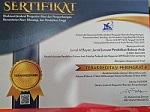Gender Bias in Arabic: Analysis of Jacques Derrida's Deconstruction Theory l Al-Taḥayuz al-Jinsânĩy fĩ al-Lugah al-‘arabiyyah: Taḥlĩl Nazariyyah al-Tafkĩkiyyah Jacques Derrida
Abstract
Keywords
Full Text:
PDFReferences
A Avishal, Orit. Afshan Jafar and Rachel Rinaldo, "A Gender Lens on Religion", Journal of Gender and Society, Vol. 29, No. 1 ( 2015):18
Ahmad, Syed Sahid. ‘The Noun: A Comparative Analysis between The Arabic and The English Languages’, Journal of Humanities and Social Science (IOSR-JHSS), 22 (2017): 71
Alkohlani, Fatima A. ‘The Problematic Issue of Grammatical Gender in Arabic as Foreign Language’, Journal of Language and Cultural Education, 4, (2016): 27
Al-Faruqi, Ismail R. dan Lois Lamya Al-Faruqi, Atlas Budaya Islam. Bandung: Mizan, 2003.
Al-Kurdi, Ahmad al-Hajji. أحكام المرأة في الفقه الإسلامي, Alih bahasa:Moh. Zuhri dan Ahmad Qorib. Semarang: Dina Utama, 1995.
Abu Zayd, Nasr Hamid. Dekonstruksi Gender: Kritik Wacana Perempuan dalam Islam, Yogyakarta: Samha, 2003
Arbain, Janu. "Pemikiran Gender Menurut Para ahli: Telaah atas Pemikiran Amina Wadud Muhsin, Asghar Ali Engineer dan Mansour Fakih", SAWWA, 11, (2015): 76
Arika, Merdu.في روأية "زينة" لنوال السعداوي" النسوة", Jurnal Al-Sinatuna, 3, (2017): 60
Chalik, Abdul. "Interpretasi Ayat-Ayat Gender Perspektif Islam Liberal Tentang Kepemimpinan Politik Perempuan", Jurnal Mutawatir, 5,( 2015): 253
El Kurd, Dana. "Public Opinion of Women’s Rights and Democratic Values", Arab Center For research & Policy Studies: AlMutaqa, 1, (2018)
Erlina, ‘Perspektif gender dalam Buku Teks Bahasa Arab “Al-Arabiyah Baina Yadaika”, Jurnal Al Bayan, 5 (2013): 109
Eckert, Penelope dan Ginet, SallyMcConnell. Language and Gender. New York: Cambridge University Press, 2003
Fathul Mujib, Fathul. Rekonstruksi Pendidikan Bahasa Arab. Yogyakarta: Pedagogia, 2010
Goehring, Dorothy Lee. ‘Muslim Women on The Internet: Social Media as Sites of Identity Formation’, Journal of South Asian and Middle Eastern Studies, 42 (2019): 20-34
Haryatmoko, Membongkar Rezim Kepastian Pemikiran Kritis Post-Strukturalis. Yogyakarta : PT. Kanisius, 2016
Ismail, Zaky. "Perempuan dan Politik pada Masa Awal Islam (Studi tentang Peran Sosial dan Politik Perempuan pada Masa Rasulullah)", Jurnal Review Politik, 06 (2016): 59
Kamal, Hala. "Translating Women and Gender: The Experience of Translating "The Encyclopedia of Women and Islamic Cultures into Arabic", Journal of Women's Studies Quarterly, 36 (2008): 254-268
JM. Muslimin, JM. "Shari’a, Indigenous Wisdom and Human Rights", Journal of Indonesian Islam, 09, (2015): 123
Muhammadun, Muzdalifah. "Penanda Gender dalam Perspektif Bahasa Arab dan Bahasa Indonesia (Sebuah Analisis Kontrastif)’, Jurnal AlMaiyyah, 9 (2016): 254-268
Norris, Christopher. Membongkar Teori Dekonstruksi Jacques Derrida. Yogyakarta: Ar-Ruzz, 2003
Nina Nurmila, "Pengaruh Budaya Patriarki Terhadap Pemahaman Agama dan Pembentukan Budaya", KARSA, 23 ( 2015): 14
Rofiah, Nur. ‘Bahasa Arab sebagai Akar Bias Gender dalam Wacana Islam’, (Makalah disampaikan dalam Annual Conference Kajian Islam di Grand Hotel Lembang, Minggu-Kamis, 26-30 November 2006.
Rosenhouse, Judith and Dbayyat, Nisreen. "Gender Switch in Female Speech of an Urbanized Arabic Dialect in Israel", Journal of Anthropological Linguistics, 48, (2006): 169-186
Roded, Ruth. "Jewish and Islamic Religious Feminist Exegesis of The Sacred Books", Journal of Jewish Women’s Studies & Gender Issues, 29, (2015): 68
Seguino, Stephani. "Global Trends in Gender Equality", Journal of African Development,’ 18, (2016): 9-28
Sarah, Majid. Identity, "Ideology and Language; A Literature Review of The Theoretical Anshors and Empirical studies", Arab World English Journal (AWEJ), 9, Juni (2018): 59
Syakur, Nazri. Revolusi Metodologi Pembelajaran Bahasa Arab. Yogyakarta: Pedagogia, 2010
Setyaningsih, Sri Isnani. ‘Bias gender dalam Verba: Sebuah Kajian Leksikon dalam Bahasa Inggris’, Jurnal SAWWA, 11, (2015): 25-50.
Taufiqurrahman, Leksikologi Bahasa Arab. Malang: UIN Malang Press, 2008
Trentman, Emma. ‘Arabic Heritage Learners Abroad: Language Use and Identity Negotition’, Jurnal Al-‘Arabiyya, 48, (2015): 141
Umar, Nasaruddin. Argumen Kesetaraan Jender Perspektif Al-Qur’an. Jakarta: Paramadina, 2001
Wiratno, Tri. Ringkas Linguistik Sistemik Fungsional. Yogyakarta: Pustaka Pelajar, 2018
White, David A. "Derrida on Being as Presence", JSTOR: De Gruyter, (2017): 228-229
Wildana Wargadinata, "Tradisi Arab di Fase Nabi dalam Perspektif Teori Change and Continuity", Jurnal El-Harakah, 5, (2003): 53-54
Wahyuni, Imelda, "Pengetahuan Bahasa Arab dalam Memahami Bias Gender Pada Terjemahan Al-Qur’an Versi Kementerian Agama", Jurnal AlMaiyyah, 9, (2016): 87-103
DOI: http://dx.doi.org/10.24042/albayan.v12i2.6334
Refbacks
- There are currently no refbacks.
Copyright (c) 2020 Jurnal Al Bayan: Jurnal Jurusan Pendidikan Bahasa Arab
License URL: https://creativecommons.org/licenses/by-sa/4.0
Editorial Office:
Jurnal Al Bayan: Jurnal Jurusan Pendidikan Bahasa Arab, Arabic Education Study Program, Faculty of Education and Teachers Training, Unversitas Islam Negeri Raden Intan Lampung
Jl. Endro Suratmin 1 Sukarame, Bandar Lampung 35131-Indonesia
e-mail: jurnalalbayan@radenintan.ac.id
http://ejournal.radenintan.ac.id/index.php/albayan/index
Jurnal Al Bayan: Jurnal Jurusan Pendidikan Bahasa Arab is licensed under a Creative Commons Attribution-ShareAlike 4.0 International License. p-ISSN 2086-9282 | e-ISSN 2549-1229









